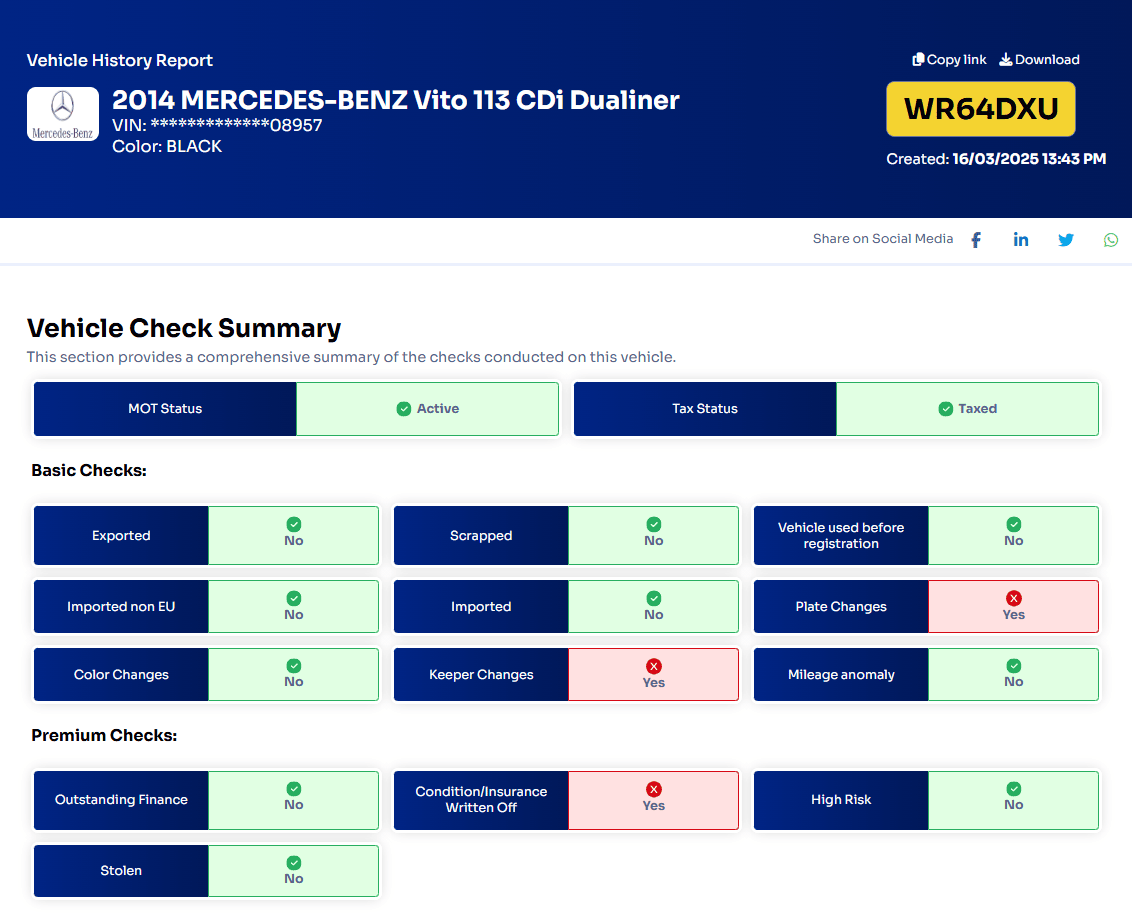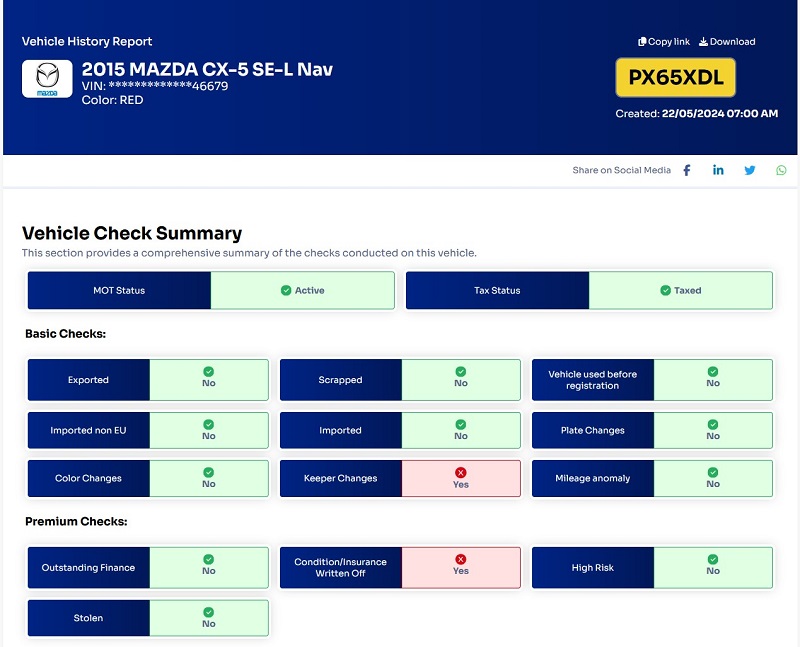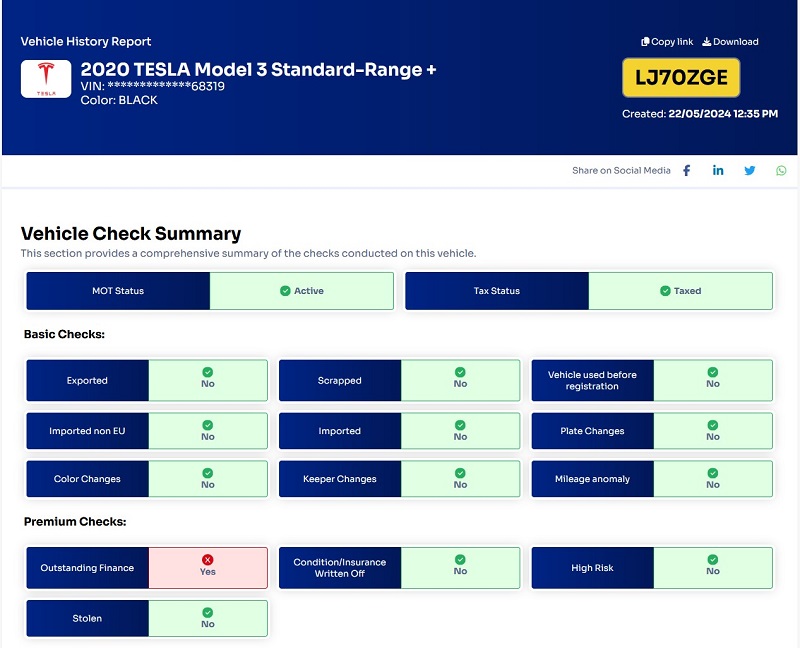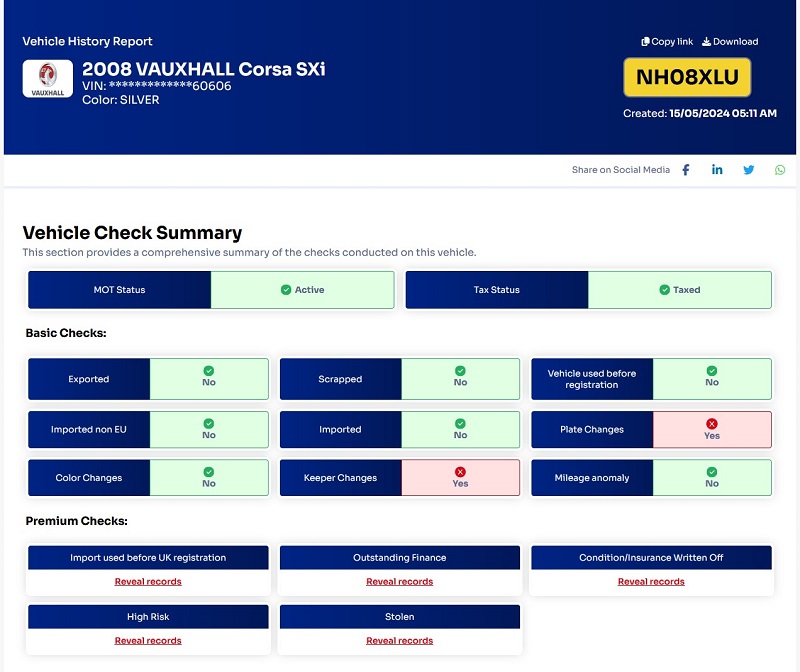- Lowest price check
- Great Customers Review
- Fast and Accurate
- Lowest price check
- Great Customers Review
- Fast and Accurate
Don't Buy Blind - Get Full Auction History
Verify a car’s full auction history before buying with our instant car auction history check. Find dates, prices, accidents, write-offs, mileage, and more. Enter reg and get peace of mind before buying.
What Is a Car Auction History Check?
A car auction check is part of a car history check that reveals if a vehicle has been through auction houses in the past. By using the registration number, it can show how many times the car was sold, the prices recorded, and in some cases, buyer or seller information.
It may also include details of any reported accidents or damage. This helps buyers understand the vehicle’s past, identify potential problems, and make safer, informed decisions before purchasing.
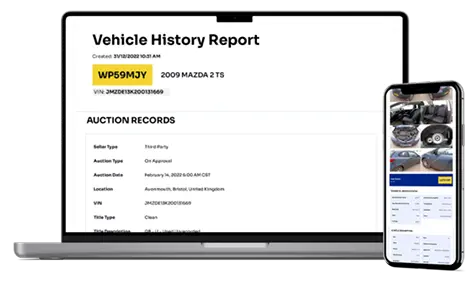
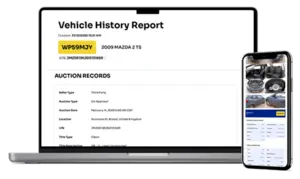
Why is Car Auction History Check important?
An auction history check helps reveal valuable details about a car’s past sales, ownership, and condition, giving you greater confidence when buying a used vehicle. Here’s why you need to check car auction history:
Spot Frequent Resales
If a car appears in auctions too often, it could signal reliability issues. Frequent resales suggest hidden faults, which an auction history check can help you avoid before committing to buy.
Confirm Sale Prices
An auction history check reveals past sale prices, helping you judge whether the asking price is fair. This prevents overpaying and ensures you understand the vehicle’s true market value.
Identify Previous Damage
Some auction records include accident or damage details. Knowing this helps you avoid buying a car with hidden repairs that could affect safety, performance, or long-term maintenance costs.
Understand Ownership Patterns
Auction history shows changes in owners or sellers, giving insight into how a car has been managed. A car quickly sold multiple times may carry potential risks worth considering.
Protect Against Fraud
Checking vehicle auction history protects you from dishonest sellers hiding important details. By confirming records, you reduce the risk of buying a car with false claims or misleading background information.
Make a Smarter Purchase
An auction history check provides clarity and transparency. By knowing a car’s true journey through auctions, you can negotiate better, avoid surprises, and make a confident, well-informed decision.
The Impact of a Car Auction History on the Resale Value
A car’s auction history can make a big difference to how much it’s worth when you sell.
How Buyers See Auctioned Cars?
Buyers often see auctioned cars as riskier, especially if they’ve been sold multiple times in a short period. It may raise questions about hidden issues, previous damage, or why the car keeps changing hands – all of which can push the resale price down.
Fewer Resales Increase Buyer’s Trust in Auctioned Cars
On the flip side, a car with a clean or limited auction history often attracts more trust and better offers. When buyers see fewer resales and no record of damage, they’re usually willing to pay more. In short, knowing and understanding a car’s auction history not only protects you when buying, but also helps you set the right price when selling.
The Risks of Buying a Car Without Checking Its Auction History
According to industry figures, more than 12,000 vehicles are sold at auction weekly in the UK. While many are genuine bargains, some carry hidden problems that sellers won’t mention. Without checking a car’s auction history, buyers risk purchasing vehicles with the following issues:
Hidden damages
Cars sold at auction may have accident damage not visible at first glance. Without checking auction history, you risk buying a vehicle with costly hidden repairs that affect safety and performance.
Mileage tampering
Some auctioned cars may have clocked or altered mileage. An auction history check highlights discrepancies, ensuring you don’t overpay for a vehicle with more wear and tear than the seller claims.
Overpaying
Without knowing the car’s auction sale prices, you might pay more than it’s really worth. Auction history helps you judge fair value, preventing financial loss and protecting your investment.
Stolen vehicles
Stolen cars sometimes pass through auctions with false details. An auction history check compares records against databases, helping you avoid buying stolen vehicles that could later be seized by authorities.
Flood damage
Vehicles exposed to flooding may appear fine but suffer long-term electrical or mechanical issues. Auction history checks reveal if the car was previously marked for flood damage or environmental hazards.
Mechanical issues
Some cars are auctioned because of recurring mechanical faults. Without checking records, you risk buying a vehicle that requires constant repairs, leading to high running costs and reduced reliability.
Title issues
Auction cars may carry unresolved title or ownership disputes. An auction history check ensures the seller has legal rights, protecting you from buying a vehicle with paperwork or registration problems.
Write-off vehicle
Write-off cars sometimes reappear in auctions after repairs. Auction history highlights previous insurance write-offs, helping you avoid cars that may be unsafe or worth far less than advertised.
No warranty
Many auctioned vehicles are sold without warranty cover. Without auction history, you may unknowingly purchase a car offering no protection against faults, leaving you responsible for expensive repairs.
How to Check a Car Auction History?
To check a vehicle auction history, simply follow these steps:
Step 1: Enter the Registration Number
Type in the vehicle’s registration number into the form on this page to start your search. You can also check car auction history by VIN.
Step 2: Click the “Search” Button
Click the “Search” button to retrieve auction-related information.
Step 3: View the Auction History
You’ll see past auction listings, seller info, title status, reported damages, and available photos.
What is Included in Our Car Auction History Check?
A car auction check typically includes information about a vehicle’s past sales at auction. By checking vehicle auction history, you’ll gain access to the following information:
Auction Dates and Locations
The report shows the exact dates and places where the car was sold at auction. This helps you see how often the car has been sold and where it has been.
Sale Prices
You can view the prices the car sold for in different auctions. This makes it easy to understand how the car’s value has changed over time and if the current price is fair.
Buyer and Seller Information
The report may show details about the buyers and sellers from each auction. This can tell you if the car was sold mostly to dealers or passed around quickly, which may be a warning sign.
Written-off Status
The check shows if the car was written off at any time. It also lists the write-off category, such as A, B, C, S, or F, so you know the extent of the damage.
Reported Accidents and Damage
Any accidents or damage shared during auctions will appear in the report. This helps you avoid cars with serious issues or repeated accident history.
Odometer Readings
The auction history check may include mileage records from each auction. This lets you check if the mileage has been changed or faked, giving you more trust in the car’s history.
Title Information
The auction records show the title status of the car, such as clean, salvage, or rebuilt. This is important because a salvage or rebuilt title means the car was badly damaged in the past and repaired, which can affect safety, value, and insurance costs.
Vehicle Images
Auction checks often include up to ten (10) photos of the car taken at the auction. You can see the outside, inside, and main features of the vehicle. These pictures help you spot damage, wear, or modifications before deciding to buy.
Check Smart Car Check Sample Reports
Why Choose Smart Car Check Car Auction Check?
Buying a car at auction comes with risks but Smart Car Check helps confirm details, avoid scams, and make a safe, confident purchase every time. Here are some reasons why choosing our vehicle auction check tool is the best:
Instant Car Auction Price History Check
Quickly conduct a salvage history check for past damage, prices sold at various auctions, mileage discrepancies, write-off status and more.
Get an accurate car check report
Receive a detailed and accurate report that reveals the car’s history, ownership, and hidden records without confusion.
Affordable service, no hidden fees
Our checks are affordable, easy and transparent, so you’ll always know exactly what you’re paying for.
Access over 80+ checks
Enjoy a full report covering over 80 checks, including finance, MOT history, stolen records, write-offs, and more.
Trusted sources for trusted car details
We use verified data from DVLA, police, insurers, and finance companies to give you dependable car details.
Smarter purchase, buy with confidence
By knowing the car’s full auction records, you can avoid costly surprises and buy confidently without second thoughts.
Check UK Auction History by Reg Number
Don’t risk it—use our reg check for auction history, write-off categories, finance checks, MOT results, stolen records, and more. Stay safe when buying used cars.
Get our Smart Car Check Mobile App
Looking for the best car history check in the UK? Download the Smart Car Check App today. With just a registration number, you can instantly detect hidden history, past problems, or issues the seller won’t mention. Make smarter, safer decisions before buying any vehicle.
FAQ About Car Auction History Check
What is a salvage auction history check?
A salvage auction history check lets you see if a vehicle was ever sold at a salvage auction. This car auction history UK can reveal whether the car was damaged, repaired, or written off, helping buyers avoid unsafe or overpriced vehicles.
Can I check if a vehicle has been sold?
Yes, you can check if a vehicle has been sold by looking at its car auction history. By using the Smart Car Check tool, you can access the car auction history, which reveals past sales and the car’s true history.
How to find a car that was sold at auction?
To find a car sold at auction, use our car auction check tool. You can check car auction history by VIN or by entering the vehicle registration to lookup past sales, including sale prices, photos, and any damage.
Do auction cars come with a service history?
Not always. Many cars sold at auctions may lack full service records. Checking a car auction history helps confirm if important documents are missing. Always run a car auction history check to ensure you’re not buying blindly.
Is it worth checking a car's auction history before buying it?
Yes, absolutely. A car auction history check gives you crucial details about hidden damage, sales frequency, or title issues. In the UK, checking car auction history protects buyers from financial risks and unsafe vehicles.
Can I check car auction records by VIN?
Yes, definitely. You can check car auction records by VIN using Smart Car Check’s VIN check service in the UK. This will help reveal any damage records, auction photos, real car condition, and salvage history. With this check, you can avoid legal or hidden issues and fraud associated with buying used cars in the UK.
How to view the Copart vehicle report?
To view a Copart vehicle report, simply enter the car registration number into our vehicle auction history check tool. This report gives clear details about the vehicle specifications, sale price, history, mileage, MOT history, and more, thus helping used car buyers make safer, more informed decisions.
How Auction History Works?
Auction history works by recording every time a car is sold through auctions. In the UK, a car auction history report lets buyers check car auction history, including sale prices, damages, mileage records, title issues, and more.
Can you drive a car bought from an auction?
You can only drive a car bought from auction once it’s roadworthy, insured, and taxed. Before that, always check car auction history to confirm if it has damage, MOT failures, or other hidden risks that could affect its roadworthiness, reliability, and safety.
Is it okay to buy a car from an auction with no V5?
It’s risky. Cars sold without a V5 logbook may have ownership or title problems. Always check the car auction history UK before buying, to confirm the car’s history, ownership changes, and any potential legal complications.
Is it worth buying a car from an auction in the UK?
Yes, auctions can offer good deals, but risks exist. That’s why it’s recommended to always run a car auction history check first. You must also be able to inspect the car thoroughly. This ensures you don’t overpay, avoid damaged vehicles, and get a clearer picture of the car’s true value.
How to register a car bought from an auction without a V5?
To register a car you bought at auction without a V5C logbook, you’ll need to complete a V62 form and send it to DVLA. Remember to include the green “new keeper” slip and a £25 fee. If you don’t have the slip, the same fee still applies. You’ll also need the car’s registration number and VIN or chassis number to process the application.
Is Smart Car Check Auction Check Legit?
Yes, Smart Car Check is one of the leading and largest providers of accurate and comprehensive car check reports in the UK. Each report provides accurate and up-to-date information on the auction history by retrieving data from trusted sources.
What happens if you don’t pay the DVLA Auction?
If you successfully bid for a DVLA number plate but do not settle the payment within five working days, a late fee of £50 will be added for each lot, per week, until cleared. Failure to pay may result in DVLA cancelling the registration number without offering any refund, meaning you will lose the plate.

